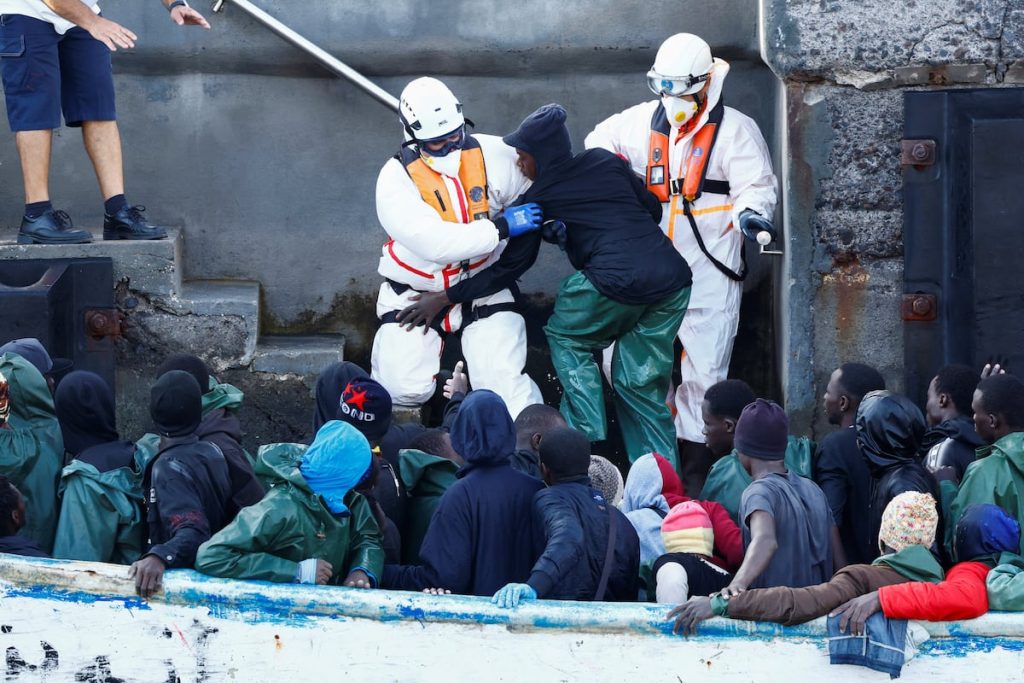The Canary Islands route shows no mercy, neither does the search for bodies. A new boat arrived on Monday morning at the port of La Restinga with 77 people on board (70 men, four women, and three minors), according to Salvamento Marítimo. This latest arrival adds to the one registered on Sunday at 9:00 pm south of Tenerife, with another 81 people including four minors. In total, 158 people have arrived on the islands in a few hours, while rescue teams continue searching for bodies after the shipwreck last Saturday. On Monday, the City Council of Valverde buried three of the only nine bodies that could be rescued in the early hours of Saturday in a ceremony attended by more than 70 people. Meanwhile, the Superior Court of Justice of the Canary Islands has ratified the suspension of the new regional protocol for the care of migrant minors —which tightened procedures— in a ruling that partly recognizes the regional government’s overwhelmed capacity to accommodate and urges all administration to work with institutional loyalty to try to reverse the situation.
Three boats and two helicopters continued for the third consecutive day the search for the bodies of the fifty people who sank in the sea in the early hours of Saturday when their boat capsized just seven kilometers off the coast of El Hierro while the precarious boat was being assisted by the Guardamar Calíope. There were only 27 survivors —including four minors— and nine bodies —including that of a child— were recovered. Authorities have ruled out finding more survivors, raising the death toll to around 60 in what is one of the worst tragedies in the Canary Islands in three decades. The Board of Spokespersons of the island council declared three days of official mourning on Monday.
As the search continued, on Monday at 9:47 am, another boat carrying 77 people arrived on the island’s coast after a four-day journey from Nuadibú (Mauritania), as reported by some of them to the emergency services. One of the migrants had to be hospitalized for hypothermia and hypoglycemia. On Sunday night, another boat with 81 occupants on board, including two women and four minors, arrived at the Tenerife marina of Marina de San Miguel de Abona. One of the occupants of this boat was evacuated to a hospital.
The tragedy of Saturday’s shipwreck and the continuous influx of arrivals are putting pressure on the PSOE and the PP to reach an agreement that would allow the distribution of migrant minors throughout the national territory to relieve the strain on the hosting network in the Canary Islands. The tragedy has prompted the Canary Islands government to once again call for urgent assistance, both from the State and the European Union. “We are in a situation of a humanitarian crisis in capital letters,” said regional president Fernando Clavijo on Saturday. “We need help, the people of the Canary Islands need help,” he added.
This week, the central government, the regional government, and the Popular Party are expected to resume negotiations after more than five months of deadlock and crossfire. The regional government has launched an offensive to accelerate agreements since the beginning of the month. Clavijo announced on the 2nd that the legal services of the regional government were looking into possible routes, including criminal, to establish that unaccompanied migrant children arriving on their shores are under police custody, not abandoned. On the same day, the Government Council approved a disposition prohibiting collaborating entities from receiving new migrants without permission from the regional government. These government movements culminated on the 12th when the archipelago government announced a new reception protocol, complicating the reception of unaccompanied migrant minors by conditioning it to various procedures and availability of spaces. The prosecutor immediately opposed this new regulation and the Superior Court of Justice of the Canary Islands suspended the protocol “provisionally” on the 13th.
The Canary Islands government appealed this suspension, but the TSJC did not comply with their request and confirmed the suspension of the minor reception protocol on Monday. The court, however, acknowledged the regional government’s complaints about the State’s actions and urged all administrations to work together to improve the situation. The court stressed the overload of the archipelago’s hosting capacity for unaccompanied migrant minors, calling for loyalty and collaboration among all stakeholders to address these issues. The tension between the parties is evident, with the Canary Islands government seeking urgent assistance and support from the State and the EU to address the ongoing humanitarian crisis in the region.


